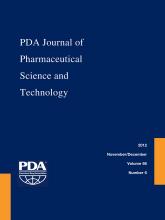Abstract
The limulus amebocyte lysate (LAL) test is the simplest and most widely used procedure for detection of endotoxin in parenteral drugs. The LAL test demands optimal pH, ionic strength, temperature, and time of incubation. Slight changes in these parameters may increase the frequency of false-positive responses and the estimated uncertainty of the LAL test. The aim of this paper is to evaluate how changes in the pH, temperature, and time of incubation affect the occurrence of false-positive responses in the LAL test. LAL tests were performed in nominal conditions (37 °C, 60 min, and pH 7) and in different conditions of temperature (36 °C and 38 °C), time of incubation (58 and 62 min), and pH (6 and 8). Slight differences in pH increase the frequency of false-positive responses 5-fold (relative risk 5.0), resulting in an estimated of uncertainty 7.6%. Temperature and time of incubation affect the LAL test less, showing relative risks of 1.5 and 1.0, respectively. Estimated uncertainties in 36 °C or 38 °C temperatures and 58 or 62 min of incubation were found to be 2.0% and 1.0%, respectively. Simultaneous differences in these parameters significantly increase the frequency of false-positive responses.
LAY ABSTRACT: The limulus amebocyte lysate (LAL) gel-clot test is a simple test for detection of endotoxin from Gram-negative bacteria. The test is based on a gel formation when a certain amount of endotoxin is present; it is a pass/fail test. The LAL test requires optimal pH, ionic strength, temperature, and time of incubation. Slight difference in these parameters may increase the frequency of false-positive responses. The aim of this paper is to evaluate how changes in the pH, temperature, and time of incubation affect the occurrence of false-positive responses in the LAL test. We find that slight differences in pH increase the frequency of false-positive responses 5-fold. Temperature and time of incubation affect the LAL test less. Simultaneous differences in these parameters significantly increase the frequency of false-positive responses.
- © PDA, Inc. 2012
PDA members receive access to all articles published in the current year and previous volume year. Institutional subscribers received access to all content. Log in below to receive access to this article if you are either of these.
If you are neither or you are a PDA member trying to access an article outside of your membership license, then you must purchase access to this article (below). If you do not have a username or password for JPST, you will be required to create an account prior to purchasing.
Full issue PDFs are for PDA members only.
Note to pda.org users
The PDA and PDA bookstore websites (www.pda.org and www.pda.org/bookstore) are separate websites from the PDA JPST website. When you first join PDA, your initial UserID and Password are sent to HighWirePress to create your PDA JPST account. Subsequent UserrID and Password changes required at the PDA websites will not pass on to PDA JPST and vice versa. If you forget your PDA JPST UserID and/or Password, you can request help to retrieve UserID and reset Password below.






